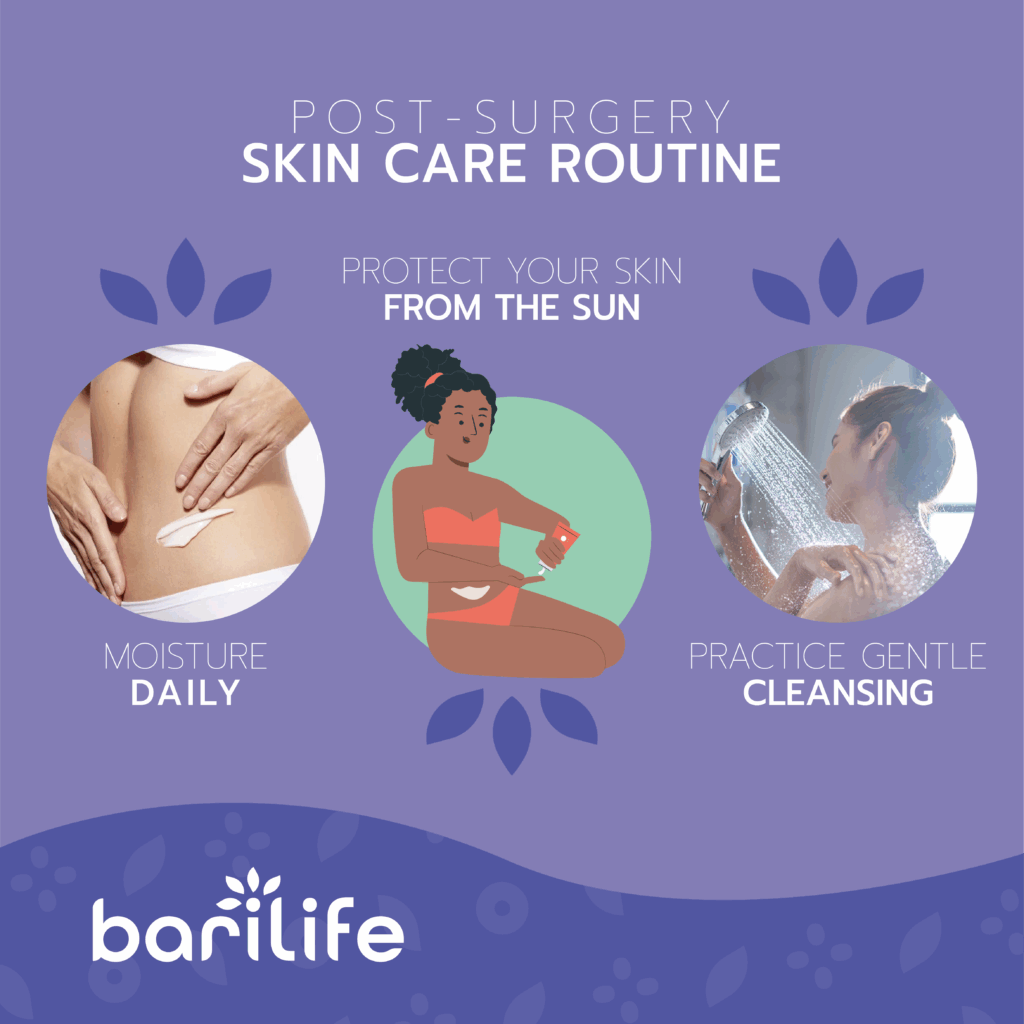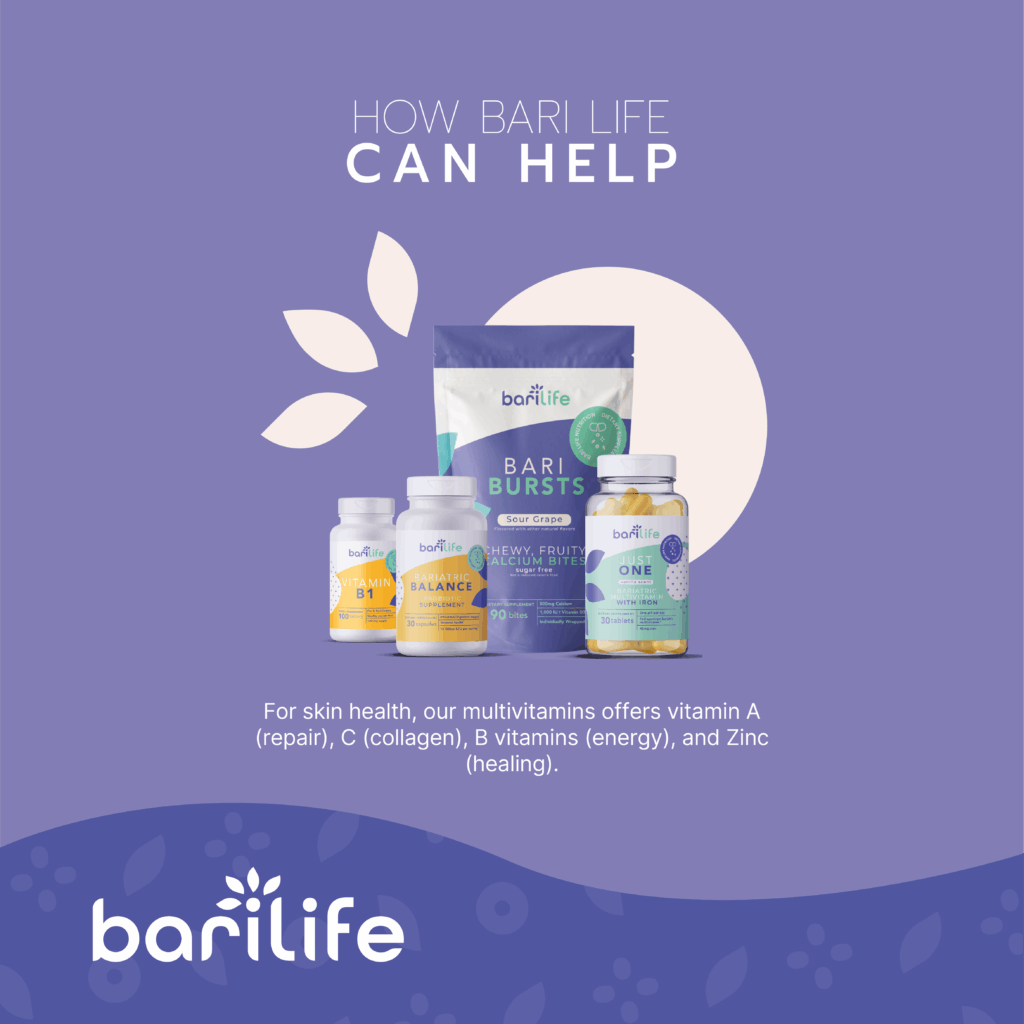Key Takeaways:
- Bariatric surgery results in drastic weight loss but also affects your skin, muscles, and overall appearance
- Proper skin care before and after surgery can minimize some common skin issues after bariatric surgery
- Long-term success requires consistent lifestyle habits, including exercise, proper nutrition, and skincare
When you’re about to undergo bariatric surgery, it’s important that you’re aware of what happens to your body before and after so you can set realistic expectations. From dramatic weight changes to skin transformations, this guide covers everything you need to know about the journey ahead.
Understanding Bariatric Surgery and Its Impact

Bariatric surgery encompasses several procedures designed to help people with severe obesity lose weight by changing how the digestive system works. These surgeries either restrict how much food your stomach can hold, reduce nutrient absorption, or both.
Their impact goes far beyond just weight loss. After bariatric surgery, many people experience significant improvements in obesity-related health issues such as type 2 diabetes, high blood pressure, sleep apnea, and joint pain.
However, bariatric procedures aren't without risks. Potential complications include nutritional deficiencies, surgical risks common to any major operation, and the need for lifelong lifestyle changes. The decision to pursue bariatric surgery requires careful consideration of these benefits and challenges.
Physical Transformations After Bariatric Surgery
The most visible change after weight loss surgery is, of course, significant weight reduction. Most people lose weight rapidly in the first six months after surgery, with weight loss continuing more gradually for up to two years. Bariatric sleeve before and after photos often show dramatic transformations, with many people losing 60-80% of their excess weight.
Beyond the numbers on the scale, your body composition will also change significantly. While fat loss is the primary goal, you might also experience some muscle loss. This is why strength training is essential after surgery. It helps preserve lean muscle mass while the fat continues to diminish.
One aspect of physical transformation that bariatric surgery pictures before and after don't always capture is the change in skin elasticity. When you lose weight quickly, your skin might not contract to match your new shape. It can actually appear loose and sagging, particularly in areas like the abdomen, arms, thighs, and chest. This is where options such as skin removal after bariatric surgery or post bariatric plastic surgery may become necessary for some patients.
Skin Changes After Bariatric Surgery
Skin issues are among the most common concerns in the before-and-after bariatric journey. When you lose substantial weight quickly, your skin often can't keep up. The result is excess skin hanging from various parts of your body. This isn't just a cosmetic concern—it can cause practical problems, too.

Excess skin folds can lead to moisture becoming trapped, which may cause irritation, rashes, and even infections. Many people report increased sweating and chafing in areas with skin folds, which makes daily activities uncomfortable.
Another skin-related challenge relates to nutrition. After bariatric surgery, your body absorbs fewer nutrients, which can manifest as various skin problems. You might notice increased dryness, slower wound healing, or hair loss. These issues often improve as your body adjusts and with proper supplementation.
Preparing Your Skin Before Bariatric Surgery
While some skin changes are inevitable with significant weight loss, being prepared can help minimize their severity. In the months leading up to your surgery, you’ll want to focus on these skin-supporting strategies.
Hydration
Aim to drink plenty of water daily, which supports skin health from the inside out. This habit also helps prepare you for the water routine that’s required after surgery—slow sips throughout the day and no drinking right before, during, and right after meals.
Nutrition
Nutrition plays a key role in skin health. Start to incorporate plenty of protein, which provides the building blocks for skin tissue. Foods high in vitamins A, C, E, and B-complex also support skin health, as do minerals like zinc.
Stop smoking
If you smoke, quitting well before surgery is one of the best things you can do for your skin. Smoking restricts blood flow to the skin, diminishes elasticity, and impairs healing—all factors that can worsen loose skin after weight loss.
Post-Surgery Skin Care Routine
After bariatric sleeve surgery, and your physical transformation begins, you’ll need to have a dedicated skincare routine. Once your doctor clears you for normal activities, you can start to incorporate these practices:
- Moisturize daily with products containing ingredients like hyaluronic acid, ceramides, or shea butter.

- Apply moisturizer on damp skin to lock in hydration.
- Pay special attention to areas that are prone to dryness or where skin rubs against itself.
- Protect your skin from the sun, since this can make elasticity issues worse.
- Put on a broad-spectrum sunblock that has an SPF of 30 or higher every day, even during cloudy days.
- Practice gentle cleansing to avoid stripping natural oils from your skin.
- Use lukewarm water and mild cleansers free from harsh detergents or fragrances.
Managing Loose Skin and Treatment Options
For many people, loose skin becomes a major concern after they've reached their weight loss goals. While there's no magic solution, several approaches can help improve your skin's appearance and comfort.
Strength training can make a noticeable difference, not by eliminating loose skin, but by building muscle underneath to fill out some of that extra space. Try focusing on exercises that target your problem areas, whether that's your arms, abdomen, or thighs. You don't need to wait until you're fully recovered, either. Even gentle strength exercises can be beneficial once your doctor gives you the green light during your bariatric recovery time.
You might also find some relief in skincare products, though their effects are more modest. Look for moisturizers that contain retinol to boost cell turnover and collagen production, peptides to support skin firmness, or hyaluronic acid for deep hydration. While these won't transform severely loose skin, they can improve its texture.
If loose skin is negatively impacting your quality of life, surgical options like tummy tucks, arm lifts, or lower body lifts might be worth considering. These procedures can remove excess skin and create a more contoured appearance that better matches your new, healthier weight. Just keep in mind that most surgeons advise waiting until your weight has been stable for at least 12-18 months before pursuing these options.

Long-Term Weight Maintenance and Skin Health
Maintaining your weight loss and keeping your skin as healthy as possible requires ongoing commitment after bariatric surgery. Regular exercise does double duty—it helps keep the weight off while improving your skin's appearance by boosting circulation and maintaining muscle tone. Try mixing up your routine with some cardio to burn calories, strength training to shape your body, and flexibility work to keep everything moving smoothly. Even a 30-minute daily walk can make a significant difference in how you look and feel.
What you eat matters just as much now as it did right after surgery. Focus on having meals with protein-rich foods since these help maintain muscle and repair tissues. Also include colorful fruits and vegetables packed with skin-supporting vitamins, and plenty of water to keep your skin hydrated from the inside out.
Don't forget the value of regular check-ups with your healthcare team, even years after your surgery. Many people feel shy about discussing skin concerns, but your doctors have seen it all before and can provide solutions specific to your situation, from supplement recommendations to specialized treatments.
Conclusion
While bariatric surgery results pictures often highlight the positive transformations, understanding the full spectrum of changes, including skin challenges, helps you prepare realistically for what lies ahead.
With enough preparation before surgery and dedicated care afterward, you can enhance your results and address many common skin concerns. Remember that this transformation is gradual; your body needs time to adjust to its new state. The most successful before-and-after-bariatric surgery stories come from those who view the procedure not as a quick fix but as a tool to support lasting lifestyle changes.
How Bari Life Can Help
Proper nutrition is one of the most vital factors in supporting your skin health and overall well-being before and after bariatric surgery. This is where Bari Life comes in with bariatric vitamins and nutritional support designed specially for bariatric needs.

Our complete bariatric multivitamins formulations contain essential nutrients that support skin health, including vitamin A for tissue repair, vitamin C for collagen production, B vitamins for cellular energy, and zinc for wound healing. These nutrients are especially important after bariatric surgery when your body's ability to process nutrients is drastically reduced.
Bari Life offers a full range of bariatric vitamins chewable, liquid bariatric vitamin options, and bariatric multivitamin with iron to meet individual needs and preferences, ensuring maximum absorption and convenience.
In addition to vitamins, our bariatric protein shakes and bariatric protein bars help support muscle maintenance and healing with high-quality protein sources designed for sensitive digestive systems. For those needing light and nutritious options between meals, we also offer bariatric snacks that are low in sugar but rich in nutrients.
To further support digestive health, Bari Life includes a specialized bariatric probiotic in our product lineup, aiding gut balance and nutrient absorption. For optimal bone health, our bariatric calcium chews provide the calcium and vitamin D your body needs in a tasty, easy-to-digest format.
Hair thinning is a common concern post-surgery. That’s why our products include bariatric vitamins for hair loss to support healthy hair growth with biotin, zinc, and other essential nutrients.
Take control of your nutrition and support your transformation journey. Visit Bari Life's website today to explore our complete line of bariatric-specific supplements designed to support your best possible before and after results.
If you want to learn more, why not check out these articles below:
Resources
Protein and Bariatric Surgery. (2023). NHS.
Binnetoğlu, K. (2023). Nutrition and Patient Follow-up in Bariatric Surgery. The Eurasian Journal of Medicine.
Manzoni, S., & Weber, M. B. (2015). Skin changes after bariatric surgery. Anais Brasileiros de Dermatologia.

Leave a Comment
Your email address will not be published.